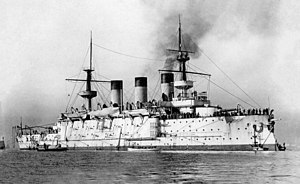Japanese battleship Suwo

Sister ship Peresvet at anchor, 1901
|
|
| History | |
|---|---|
|
|
|
| Name: | Pobeda |
| Namesake: | Victory |
| Ordered: | 26 April 1898 |
| Builder: | Baltic Works, Saint Petersburg, Russia |
| Cost: | 10,050,000 rubles |
| Laid down: | 21 February 1899 |
| Launched: | 10 May 1900 |
| In service: | October 1902 |
| Fate: | Sunk, 7 December 1904 |
|
|
|
| Name: | Suwo |
| Namesake: | Suō Province |
| Acquired: | Refloated, 17 October 1905 |
| Commissioned: | October 1908 |
| Struck: | 1922 |
| Fate: | Probably scrapped, 1922–23 |
| General characteristics | |
| Class and type: | Peresvet-class pre-dreadnought battleship |
| Displacement: | 13,320 long tons (13,534 t) |
| Length: | 434 ft 5 in (132.4 m) |
| Draft: | 26 ft 3 in (8.0 m) |
| Installed power: |
|
| Propulsion: | 3 shafts, 3 Vertical triple-expansion steam engines |
| Speed: | 18 knots (33 km/h; 21 mph) |
| Range: | 6,200 nmi (11,500 km; 7,100 mi) at 10 knots (19 km/h; 12 mph) |
| Complement: | 27 officers, 744 men |
| Armament: |
|
| Armor: |
|
Pobeda, (Russian: Победа, translit. Victory), was the last of the three Peresvet-class pre-dreadnought battleships built for the Imperial Russian Navy at the end of the nineteenth century. The ship was assigned to the Pacific Squadron upon completion and based at Port Arthur from 1903. During the Russo-Japanese War of 1904–1905, she participated in the battles of Port Arthur and the Yellow Sea. Having escaped serious damage in these engagements, Pobeda was sunk by gunfire during the Siege of Port Arthur, and then salvaged by the Japanese and placed into service under the name Suwo (周防?).
Rearmed and re-boilered by the Japanese, Suwo was reclassified by the Imperial Japanese Navy (IJN) as a coastal defense ship in 1908 and served as a training ship for several years. She was the flagship of the Japanese squadron that participated in the Battle of Tsingtao at the beginning of World War I and continued in that role until she became a gunnery training ship in 1917. The ship was disarmed in 1922 to comply with the terms of the Washington Naval Treaty and probably scrapped around that time.
...
Wikipedia
